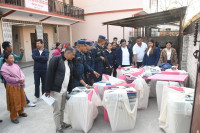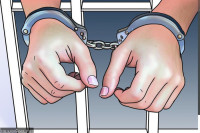National
HIV doesn’t kill—deep-rooted stigma does
Laxmi, her husband and their 14-year-old son visit Shukraraj Hospital in Kathmandu every month for antiretroviral therapy and medicines.
Arjun Poudel
Laxmi, her husband and their 14-year-old son visit Shukraraj Hospital in Kathmandu every month for antiretroviral therapy and medicines. The monthly trips to the Capital are a financial burden on this Chitwan-based family, all of whom are living with HIV. But because of deep-rooted stigma, the family chooses not to visit free treatment centres back home.
“My husband and I take turns to visit the Capital with our son,” said Laxmi, whose rented room is just 20 minutes from the nearest treatment centre in Chitwan. Laxmi’s son Rupak is healthy and doing well at school, but she fears repercussions for her son if the school administration discovered his HIV-positive status.
“It would be difficult for my son to continue school if the administration and the students learnt about his condition. The landlord would expel us too,” she said. The family also maintains social relations to the minimum, out of the fear of making public their HIV status.
According to Dr Anup Bastola, who treats hundreds of HIV patients at the country’s only tropical and infectious diseases hospital in Teku, there are hundreds of people living with HIV/AIDS who avoid treatment in their home districts because of the fear and stigma associated with the condition in society.
“Patients even shy away from using our hospital’s name when they get a phone call while they are in our
hospital. The stigma is deep rooted,” said Dr Bastola.
Over 1,500 HIV-infected people from Sarlahi, Mahottari, Janakpur, Gorkha, Chitwan, Makwanpur, Dhading and other districts visit Sukraraj Hospital for treatment. But for HIV patients who cannot afford to come to Kathmandu every month for treatment, doctors fear that they will stop seeking medical help altogether.
The hospital administration’s data correspond to the fears. Every year, over 300 people infected with the HIV virus seek treatment at the hospital.
But most of them come in too late, when they are already in the final stage. “They do not know about their HIV status. Some do not even know they can pass the disease to other people,” he said.
The National Center for HIV/AIDS and STD Control is now working to track such patients, as it is difficult to cure patients who seek treatment in the final stage and a multi-drug therapy treatment would be needed if patients discontinue treatment.
“Despite free medication and awareness drives against stigma, patients are still unable to disclose their HIV status because the stigma is deep rooted,” said the center’s director Dr Tara Nath Pokhrel.
According to the centre’s estimate, there are 31,020 HIV patients in Nepal, but records show very few of them show up for treatment in their home districts. There are currently 74 antiretroviral therapy centres in operation across the country.
(Names have been changed to protect privacy.)




 14.43°C Kathmandu
14.43°C Kathmandu















